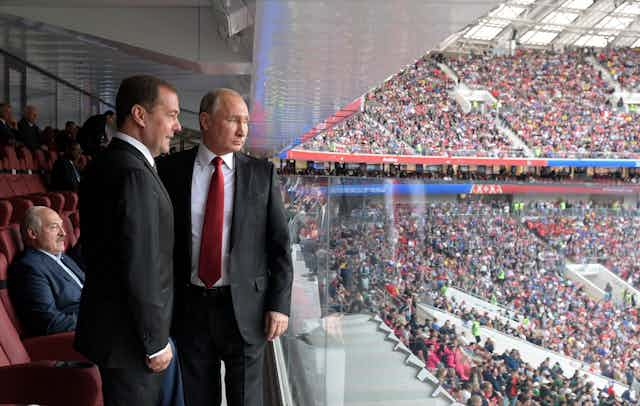Half a million soccer fans will head to Russia to watch their national teams compete in the FIFA World Cup. Billions more around the world will watch on television. Brazil and Germany are favorites to win the trophy.
But we already know one person who will emerge as a winner: Vladimir Putin.
No one is expecting the Russian team to do very well in the tournament. FIFA’s offical rankings place Russia 70th in the world – the team’s worst ever rating, and a precipitous fall from the 24th place it enjoyed as recently as 2015. Soccer is nevertheless a popular spectator sport in Russia, where sport and nationalism are closely intertwined.
As editor of Nationalities Papers, the journal of the Association for Study of Nationalities, I find that our most-read articles are often those involving soccer, a sport that can serve as a focal point for nationalist mobilization.
Putin seems to understand the ability of sport to foment feelings of national pride – and, in turn, has repeatedly used sporting events to enhance his popular standing at home.
Putin’s pet project
In 2010 Moscow won its bid to host the 2018 Cup, a successful pitch that was very much Putin’s personal project. He even traveled to Zurich and gave an emotional speech thanking FIFA for the honor. A few years later, corruption scandals brought down most of the FIFA board that had made this decision.
But by then, the decision had been finalized: Putin was set to be the first autocrat to host the World Cup since Argentina’s military junta in 1978.
Of course, this was before Putin’s controversial return to the presidency in 2012, and before the annexation of Crimea in 2014.
Now, as the World Cup begins, Russia’s standing in the world is at an all-time low.
Russia’s actions in Ukraine led to sanctions from the United States, countries in the European Union, Japan, Australia and New Zealand. Then, in 2015, Russia’s intervention in the Syrian war alienated some Arab countries, leaving Moscow with a shrunken circle of international partners that now includes China, Iran and Venezuela.
It is unlikely, then, that Russia will get much of a political boost abroad from the World Cup. Though a British effort to organize a boycott in the wake of an alleged Russian poison attack on an exiled spy fell through, few international politicians will be attending the opening and closing ceremonies.
But Putin really only has one audience in mind: his fellow Russians.
$13 billion
The Russian government has spent over US$13 billion building new stadiums and improving the infrastructure in the 11 cities where the games will be played – four times what South Africa spent when they hosted the cup in 2010. This comes on the heels of the $40 billion the country is thought to have spent on the 2014 Winter Olympics in Sochi.
With the country experiencing economic stagnation and international ostracism, Putin can use sporting mega-events such as the Olympics and the World Cup to show ordinary Russians that their country is still a major actor on the international stage, while boosting their sense of national pride.
Surveys show that Russians are even more likely than other people to express pride in their nation’s sporting achievements. In the case of the World Cup, where there are unlikely to be any victories to celebrate for the Russian team, merely hosting the event will be the main source of national pride.
A country’s seamier side exposed
Nonetheless, the strategy carries some risks. Sporting events can draw attention to the seamier side of the host country, from corruption to mismanagement to human rights abuses.
Even though the Sochi Olympics were well organized and passed without any terrorist incidents, the international media coverage in the run-up to the games highlighted Russia’s harsh policy toward LGBT rights. Subsequent revelations about state-sponsored doping led to the humiliating exclusion of the Russian team from the 2018 Winter Olympics. But Putin seems inured to negative international publicity. The sports minister who allegedly oversaw the doping scheme, Vitaly Mutko, was recently promoted to deputy prime minister.
One concern in the upcoming competition is the possibility of violent clashes between Russian gangs and visiting fans. Over the years, Russia has had a problem with aggressive nationalist soccer fans. Russian nationalists have long targeted people from the Caucasus region, and following the fatal stabbing of a nationalist fan in 2010, the three Moscow teams’ fan clubs organized a boycott of matches against teams from the North Caucasus. Racist taunts against black players are a frequent occurrence. There were ugly clashes with English fans in the 2016 UEFA European Championship in France. Afterwards, the Russian police cracked down, banning over 200 of the most radical fans from attending matches.
The authorities are also on high alert to forestall any acts of Islamist terrorism. The last major attack was a bomb in a St. Petersburg subway that killed 16 in April 2017. The security police claim to have uncovered a plot, probably imaginary, in which a left-wing anti-fascist group, the Network, was allegedly planning to bomb World Cup venues in support of Ukraine’s struggle to regain its lost territory.
The World Cup will hopefully pass off without incident. Fans worldwide will be able to enjoy the football, and deal with the agonies of defeat as, one by one, their beloved teams get eliminated from the contest.
But whoever emerges as the final victor, the World Cup will probably go down as another political win for Vladimir Putin.

